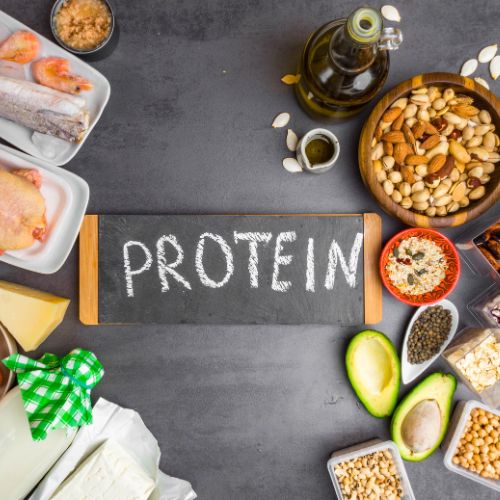
The Best Protein Sources for Building Muscle
Building muscle requires not just dedication in the gym but also a well-planned diet that includes adequate protein. Protein plays a crucial role in muscle repair and growth, making it essential for anyone looking to increase their strength and muscle mass. This guide outlines the best protein sources to help you achieve your muscle-building goals.
1. Understanding Protein and Its Role in Muscle Building
Before diving into specific protein sources, it’s important to understand what protein is and why it’s vital for muscle growth:
- What is Protein? Protein is one of the three macronutrients (alongside carbohydrates and fats) that our bodies need in large amounts. It consists of amino acids, which are the building blocks for muscles, tissues, and enzymes.
- Muscle Repair and Growth: When you exercise, especially during resistance training, your muscle fibers undergo stress and sustain micro-tears. Protein helps repair these tears, leading to muscle growth and increased strength. Consuming protein after workouts can enhance recovery and stimulate muscle protein synthesis.
2. Calculating Your Protein Needs
To effectively build muscle, it’s important to know how much protein you need:
- Recommended Intake: A common recommendation for those looking to build muscle is to consume 1.2 to 2.2 grams of protein per kilogram of body weight per day. This varies based on activity level, age, and individual goals.
- Distribution: Spread your protein intake throughout the day, aiming for about 20-30 grams of protein per meal. This helps optimize muscle protein synthesis.
3. Top Protein Sources for Muscle Building
Here’s a breakdown of some of the best protein sources you can include in your diet, categorized into animal-based and plant-based options:
Animal-Based Protein Sources
- Chicken Breast
- Benefits: Lean and packed with protein, chicken breast is a staple for muscle builders. A 3-ounce serving contains approximately 26 grams of protein and minimal fat.
- How to Use: Grilled, baked, or stir-fried, chicken breast can be incorporated into various dishes.
- Turkey
- Benefits: Similar to chicken, turkey is lean and high in protein. A 3-ounce serving provides about 25 grams of protein.
- How to Use: Use ground turkey in recipes like chili or meatballs for a healthier alternative.
- Fish (Salmon, Tuna, Cod)
- Benefits: Fish is not only a great protein source but also provides healthy omega-3 fatty acids, which are beneficial for heart health and may reduce inflammation. Salmon offers about 22 grams of protein per 3-ounce serving.
- How to Use: Grill, bake, or add fish to salads and tacos.
- Eggs
- Benefits: Eggs are a complete protein source, containing all nine essential amino acids. One large egg provides about 6 grams of protein.
- How to Use: Boiled, scrambled, or poached, eggs are versatile and can be added to numerous dishes.
- Greek Yogurt
- Benefits: Greek yogurt is thicker than regular yogurt and contains more protein, with around 20 grams per 7-ounce serving.
- How to Use: Enjoy it as a snack or add it to smoothies and desserts for extra creaminess.
Plant-Based Protein Sources
- Lentils
- Benefits: Lentils are rich in protein and fiber, with about 18 grams of protein per cooked cup. They are also low in fat and provide essential nutrients.
- How to Use: Use lentils in soups, stews, or salads for a hearty, protein-packed meal.
- Chickpeas
- Benefits: Chickpeas offer about 15 grams of protein per cooked cup and are versatile for various dishes.
- How to Use: Incorporate them in salads, make hummus, or roast them for a crunchy snack.
- Quinoa
- Benefits: Quinoa is a complete protein, providing about 8 grams of protein per cooked cup. It’s also gluten-free and high in fiber.
- How to Use: Use quinoa as a base for salads, bowls, or as a side dish.
- Tofu and Tempeh
- Benefits: Tofu has around 20 grams of protein per cup, while tempeh offers about 31 grams per cup. Both are excellent meat substitutes for plant-based diets.
- How to Use: Stir-fry, grill, or add to soups for added protein.
- Nut Butters (Peanut Butter, Almond Butter)
- Benefits: Nut butters provide healthy fats along with protein, with around 7-8 grams of protein per 2-tablespoon serving.
- How to Use: Spread on whole-grain bread, add to smoothies, or enjoy with fruits for a nutritious snack.
4. Tips for Incorporating Protein into Your Diet
Here are some practical strategies to ensure you’re getting enough protein:
- Plan Balanced Meals: Aim for balanced meals that include a protein source, healthy fats, and complex carbohydrates. For example, a grilled chicken salad with mixed greens, avocado, and quinoa.
- Snacks with Protein: Incorporate protein-rich snacks such as Greek yogurt, hard-boiled eggs, or a handful of nuts to keep your energy levels stable and support muscle recovery.
- Use Protein Supplements if Needed: If you struggle to meet your protein needs through food alone, consider protein powders or bars. These can be convenient, especially post-workout.
5. Listening to Your Body
While protein is essential for muscle building, remember to listen to your body’s needs:
- Adjust Intake: If you’re not seeing desired results, consider adjusting your protein intake. Monitor your progress and make changes as needed.
- Balance with Other Nutrients: Don’t forget the importance of carbohydrates and fats in your diet. They also play a significant role in energy levels and overall health.






